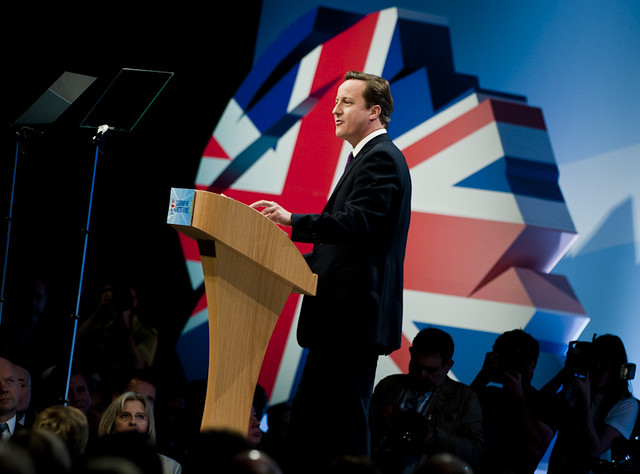 |
| Photo by Nick Pickles |
I think there's scope for saying that Cameron's speech as a whole, while not containing many passages about growth specifically, encapsulated what it actually takes for Britain's economy to grow. This was very much more a speech about the British public than it was the British government. And ultimately, it is the public that makes the economy run at all, not the government (and nor should it be the government), so why not put the emphasis on that?
At the very least it marks a difference from the previous government which took all the credit for growth - and subsequently, quite hypocritically, denied any blame for recession. (Labour likes to cite international factors as the reason for the recession, as though international trade had nothing to do with those continuous quarters of growth they boasted so gleefully about. That's when they're not pinning all the blame on the banks, where of course they had absolutely nothing to do with removing the one regulatory mechanism that would have prevented a cash flow crisis from emerging, as soon as they entered office.)
A visible British success on the international stage in Libya. A complete transformation in educational standards. A house-building revolution. A cut in burdensome health-and-safety regulation that causes more problems than it solves. A nation of good health. Where good leadership and initiative is encouraged, and promoted. Where the unemployed are ready to work, equipped with the skills and motivation they need to maximise their productivity, and Britain's with it. Where unwanted children are adopted, rather than left to the care of the state, while well-off British couples (such as David Miliband and his wife) travel overseas to adopt their own. Where young people have the discipline and the motivation that they need to succeed in life. Where marriage forms the bedrock of society (regardless of the sexual orientations of the couple involved). And all done without breaking the bank - that's the way to build a solid economic foundation for the future, not using the arms of the state to prop up failed businesses and hire workers to perform pointless tasks that often intrude into ordinary people's lives at times when they aren't welcome. It's what people do that matters, not what the state does.
In some ways it is a shame that Cameron didn't completely bring all these ideas together into the theme of their impact on economic growth, or pointing out that the "can-do" attitude can extend to what government is capable even when it's spending less overall (not that I'm convinced it is spending less overall, strictly speaking). But on the other hand, the speech was presented as a call to arms, a rallying cry to the nation, and when you're trying to address a wider audience, speaking in terms of economic jargon will rarely achieve the intended effect. (Not that there's any chance much of this wider audience will have seen the whole speech, but it's always worth putting the effort in!)
Sometimes what is needed is not a push, not a shove, but a poke, a whisper in the ear. The economy will only grow if people collectively will it to grow. And by setting an upbeat tone, with an outlook designed to motivate people into action, Cameron can probably achieve a lot more than a few dozen government initiatives. Let's just hope that the next round of GDP figures bear this out.
No comments:
Post a Comment